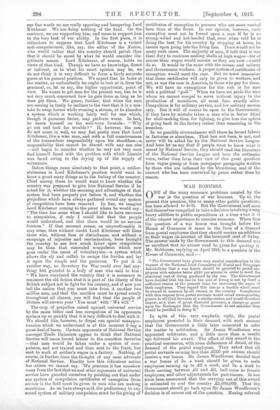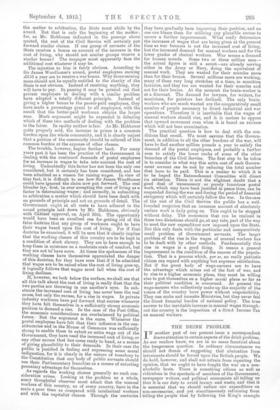WAR BONUSES.
ONE of the many economic problems created by the war is the question of war bonuses. Up to the present this question, like so many other public questions, has been allowed to drift. But the Govornmont will soon find themselves compelled to take a decision involving a, very heavy addition to public expenditure at a time when it is of the utmost importance to exercise economy. When first the question of a war bonus was brought before the House of Commons it came in the form of a demand from postal employees that they should receive an addition to their wages on account of the increased cost of living. The answer made by the Government to this demand was so excellent that no excuse need be given for quoting it. Mr. Hobliouse, replying on April 20th to a question in the House of Commons, said :-- " The Government have given very careful consideration to the request of the National Joint Committee of Postal and Telegraph Associations that a war bonus should bo granted to postal em- ployees with salaries below £210 per annum in order to moot the abnormal cost of living produced by the war. The Government have decided that the rise in the cost of living is not by itself a sufficient reason at the present time for increasing the wages of their employees. They regard this rise as a burden which must be shared in common by all classes in the country. Complianco with this request from postal servants would entail corresponding grants to all Civil Servants of a similar status, and would therefore impose, at a time of great financial pressure, a charge so groat upon the Exchequer that the Government do not consider they would be justified in doing it."
In spite of this very emphatic reply, the postal employees persisted in their demand, with such success that the Government a little Inter consented to refer the matter to arbitration. Sir James Woodhouse was appointed arbitrator, and a little inure than a month ago delivered his award. The effect of this award is the practical concession, with sonic differences of detail, of the demand of the postal employees. They asked that all postal servants earning less than £210 per annum should receive a war bonus. Sir James Woodhouse decided that a war bonus of 3s. a week should be given to male employees earning up to £2 a week, and 2s. a week to those earning between £2 and £3, half-rates to female employees, and other adjustments for part-timers. It has since been announced that the carrying out of this award is estimated to cost the country £1,080,000. That the Government should go back upon Sir James Woodhouse's decision is of course out of the question. Having referred the matter to arbitration, the State must abide by the award. But that is only the beginning of the matter ; for, as Mr. Hobhouse indicated in. the passage above quoted, the rest of the Civil Service will certainly put forward similar claims. If one group of servants of the State receives a bonus on account of the increase in the cost of living, why should not similar groups receive a similar bonus ? The taxpayer must apparently face the additional cost whatever it may be. The injustice to him is fairly obvious. According to Sir James Woodhouse's award, postal employees earning £156 a year are to receive a war bonus. Why those earning more should not be equally entitled to the charity of the State is not obvious. Instead of receiving anything, they will have to pay. In passing it may be pointed out that private employers in dealing with a similar problem have adopted a totally different principle. Instead of giving a higher bonus to the poorer-paid employees, they have made a percentage grant to all employees, with the result that the better-paid workman obtains the larger sum. Much argument might, be expended in debating which of these two methods of dealing with the problem is the fairer. In reality neither is fair. As Mr. Hobhouse quite properly said, the increase in prices is a common burden upon the whole community, and it is clearly unjust that a portion of the community should be relieved of this common burden at the expense of other classes.
The trouble, however, begins farther back. For many years past it has been the practice of the Government in dealing with the continued demands of postal employees for an increase in wages to take into account the cost of living. Undoubtedly this factor has not been the only one considered, but it certainly has been considered, and has been admitted as a reason for raising wages. In view of that fact, it is difficult to see how Sir James Woodhouse could have ignored the claim now put forward. The real blunder lay, first, in ever accepting the cost of living as a factor in determining wages ; and secondly, in submitting to arbitration a matter which should have been dealt with on grounds of principle and not on grounds of detail. The Government ought at all costs to have adhered to the sound principle laid down by Mr. Hobhouse, obviously with Cabinet approval, on April 20th. The opportunity would have been an excellent one for getting rid of the false doctrine that any group of workmen ought to have their wages based upon the cost of living. For if that doctrine be examined, it will be seen that it clearly implies that the working classes of this country are to be kept in a condition of sleek slavery. They are to have enough to keep them in existence on a moderate scale of comfort, but they are not to*have more. At times the spokesmen of the working classes have themselves appreciated the danger of this elootrine, for they have seen that if it be admitted that wages are to be raised when the cost of living goes up, it logically follows that wages must fall when the cost of living declines. If, however, we look below the surface, we shall see that all this talk about the cost of living is really dust that the two parties are throwing in one another's eyes. In sub- atance the increased cost of living has never been the real cause, but only the excuse, for a rise in wages. In private industry workmen have put forward that excuse whenever they have felt themselves in a sufficiently strong economic position to demand a rise. In the case of the Post Office, the economic considerations are overbalanced by political forces. But the argument is the same. Whenever the postal employees have felt that their influence in the con- stituencies and in the House of Commons was sufficiently strong to enable them to extort an extra wage out of the Government, they have used the increased cost of living, or any other excuse that has come ready to hand, as a, means of giving plausibility to their demands. In their case the public is justified in feeling and expressing some moral indignation, for it is clearly in the nature of treachery to the Constitution that any body of public servants should use their Parliamentary franchise as a means of extorting pecuniary advantage for themselves. As regards the working classes generally no such con- sideration arises. Looking at the problem as a whole, every thoughtful observer must admit that the manual workers of this country, as of every country, have in the main a poor time as compared with intellectual workers and with 'the 'capitalist classes. Through the centuries they have gradually been improving their position, and no one can blame them for utilizing any plausible excuse to secure a further improvement. What really determines the increases of wages that are being given at the present time as war bonuses is not the increased cost of living, but the increased demand for manual workers and for the lower grades of clerical workers. War means a demand for human muscle. Some two or three million men- the actual figure is still a secret—are already serving either in the Army or Navy, doing the equivalent of manual work. They are wanted for their muscles more than for their brains. Several millions more are working, many of them very long stretches at a time, in munition factories, and they too are wanted for their muscles and not for their brains. At the moment the brain-worker is at a discount. The demand for lawyers, for writers, for musicians, for painters has declined. The only brain- workers who are much wanted are the comparatively small number of people necessary to direct industrial and war operations. Therefore it is inevitable that the wages of manual workers should rise, and it is useless to oppose that upward movement even when it is based on excuses which will not bear examination.
The practical question is how to deal with the con- ditions that result. We must assume that the Govern- ment, in addition to all the other burdens of the war, will have to find another million pounds a year to satisfy the demand of the postal employees, and probably a further sum to satisfy the lower ranks of some of the other branches of the Civil Service. The first step to be taken is to consider in what way this extra cost of each Govern- ment servant can be met by reducing the total number that have to be paid. This is a matter to which it is to be hoped the Retrenchment Committee will direct its attention. There is not the slightest doubt that a good deal of unnecessary or purely luxurious postal work, which may have been justified in peace time, can be suspended during the war and during the period of financial stringency which will certainly follow the war. In the case of the rest of the Civil Service the public has a well. founded suspicion that an immense amount of absolutely useless work is daily going on. This ought to be stopped without delay. The economies that can be realized in these two directions should go, at any rate, part of the way to meet the new expenditure now imposed upon the State. But this only deals with the particular and comparatively small problem of Government servants. The larger problem of the rise in the wages of manual workers has to be dealt with by other methods. Fundamentally this rise in wages is a good thing. It means a general improvement in the condition of the masses of the popula- tion. That is a process which, per se, no really patriotic citizen can regard with anything but supreme satisfaction. But if the great body of wage-earners are to have the advantage which arises out of the fact of war, and to rise to a higher economic plane, they must be willing also to put themselves on a higher moral plane so far as their political condition is concerned. At present the wage-earners who collectively make up the majority of the voters of the country have power without responsibility. They can make and unmake Ilinistries, but they never feel the direct financial burden of national policy. The true answer to the inevitable increase in manual wages through- out the country is the imposition of a direJt Income Tax on manual workers.



































 Previous page
Previous page